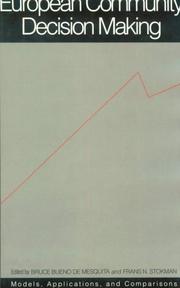Check nearby libraries
Buy this book

"This pathbreaking book illuminates the politics of issue resolution within the European Community with evaluations and comparisons of competing models of decision making across twenty-two policy issues. Written by American and Dutch scholars, the book will be of great interest to students of comparative politics, public policy analysts, mathematic modelers, and all those concerned with the development of the European Community." "One set of models explored in this volume - the expected utility model - treats politics as a conflictual activity, while the other, the exchange or log rolling model, emphasizes the cooperative nature of political processes. The alternative approaches model decision making in fundamentally different ways and make very different predictions about how issues in the European Community will be resolved. To facilitate direct comparison of their predictive and explanatory value, the models in this volume are based on the same variables: the potential control of actors over outcomes, the salience of the issues for the actors, and the outcomes preferred by the actors. The contributors test their models in the context of sixteen issues already resolved by the Council of Ministers and six issues currently under consideration, providing the reader with considerable knowledge about the controversies surrounding European Community policy on such topics as automobile emissions, nuclear radiation norms, air transport liberalization, and the European banking system. They conclude that the conflictual model and the cooperative model are less competitive and more complementary than has been thought, and they explain in detail how the models can be fruitfully combined."--BOOK JACKET.
Check nearby libraries
Buy this book

Previews available in: English
| Edition | Availability |
|---|---|
|
1
European Community Decision Making: Models, Applications, and Comparisons
June 22, 1994, Yale University Press
Hardcover
in English
0300057598 9780300057591
|
aaaa
|
|
2
European community decision making: models, applications, and comparisons
1994, Yale University Press
in English
0300057598 9780300057591
|
zzzz
|
Book Details
Classifications
The Physical Object
ID Numbers
Source records
Internet Archive item recordBetter World Books record
Library of Congress MARC record
amazon.com record
marc_columbia MARC record
Work Description
This pathbreaking book illuminates the politics of issue resolution within the European Community with evaluations and comparisons of competing models of decision making across twenty-two policy issues. Written by American and Dutch scholars, the book will be of great interest to students of comparative politics, public policy analysts, mathematic modelers, and all those concerned with the development of the European Community. One set of models explored in this volume - the expected utility model - treats politics as a conflictual activity, while the other, the exchange or log rolling model, emphasizes the cooperative nature of political processes. The alternative approaches model decision making in fundamentally different ways and make very different predictions about how issues in the European Community will be resolved. To facilitate direct comparison of their predictive and explanatory value, the models in this volume are based on the same variables: the potential control of actors over outcomes, the salience of the issues for the actors, and the outcomes preferred by the actors. The contributors test their models in the context of sixteen issues already resolved by the Council of Ministers and six issues currently under consideration, providing the reader with considerable knowledge about the controversies surrounding European Community policy on such topics as automobile emissions, nuclear radiation norms, air transport liberalization, and the European banking system. They conclude that the conflictual model and the cooperative model are less competitive and more complementary than has been thought, and they explain in detail how the models can be fruitfully combined.
Community Reviews (0)
| July 25, 2024 | Edited by MARC Bot | import existing book |
| July 31, 2020 | Edited by ImportBot | import existing book |
| January 12, 2020 | Created by ImportBot | import existing book |










